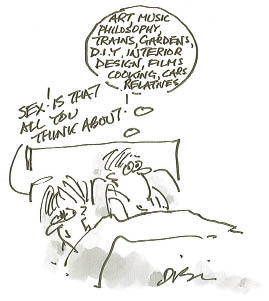I was standing in line in front of the container truck-sized skip designated for waste metal. Each Sunday, the local council puts three of these huge skips — one for wood, one for metal and one for gardening refuse — on one of its old storage sites, calls it a civic amenity centre and invites householders to bring along recycling waste that is too bulky for the fortnightly collection. It also supplies a static dustcart for rubble and cardboard and three workers to supervise, assist and keep an eye out that nobody abuses the service by sneaking in old tyres, tins of paint or asbestos.
Ten years ago, we would have all been filling a trolley at the garden centre or DIY megastore on Sunday afternoon. In today’s leaner times, here we all are queuing to get rid of all the tat we filled our houses with during the fat years, even volunteering to break it up ourselves into constituent parts for shipping back to China, where no doubt it will be remoulded into other consumables and sent back in time for the next economic upswing. I’d never seen the place so busy. The spring sunshine had tripped all our switches at once and we’d all headed out to the shed and the garage for a clear-out. I had three ornate wrought-iron Victorian underfloor heating grills and a rusted-out garden wheelbarrow to chuck in. The woman standing in front was waiting to dispose of an old dustbin. She was standing sideways on and contemplating the ceaseless activity around the back of the dustcart. It occurred to me that I’d seen her somewhere before.
It took a while to remember that it was at a mad, sweaty ska night in an upstairs room of a pub. I’d gone with Trev. We were two clodhopping male dinosaurs in a crowd of supple, energetic 20-year-olds, dancing as if our lives depended on it. Perhaps out of concern for our health, people kept giving us screwed-up cigarette papers containing a bitter chemical to swallow. These were called ‘bombs’, Trev told me in confidence. He advised me not to chew them but to drop them down my throat. He told me in confidence not because the chemical was probably illegal, but because by not knowing what they were, or what to do with them, I was showing my age, and the fact that I didn’t get out much, and this might go against both of us later when we tried to pull.
Naturally, I was further interested to know what the bitter chemical in these bombs was called. But could I ask this without it being obvious that I had one foot in the grave? I could not. These little paper screws seemed so utterly quotidian in that situation, it would have been like going to see a Grand National and asking what the animals were called that those dwarves were riding on. So when one of these bombs was pressed into my hand, instead of handling it with undisguised fear, as if it might actually go off in my palm, I tossed it insouciantly down my gullet with a shrug and a merry wave.
The dancing was so frenetic that at one point I thought I was going to have a heart attack. I fought my way out of the mêlée and went and leant against the bar for a moment to recover my breath and gulp down some lager. A woman was standing alone at the bar. She was staring at me as though momentarily paralysed by the fascination of the horrible. Then I realised that it wasn’t mental paralysis that was fixing her, rather it was a transcendental calmness. Thinking I recognised in her the rare and beatific stage of drunkenness that comes with drinking yourself sober, I grinned. She continued to stare. I held out my hand, inviting her to come and dance. She refused it but came with me. Her idea of dancing was to stand still, move her shoulders slightly back and forth, and stare fixedly at her partner. Now here she was again, holding an old dustbin.
‘If you’re throwing that away, I’ll have it,’ I said. (I thought I might punch holes in it and use it as a garden incinerator.) ‘With pleasure,’ she said, handing it over. She had a strong accent. ‘German?’ I said. ‘Swiss,’ she said. ‘Ah,’ I said. I asked her if she remembered our dancing together at the ska night. She did, she said. Very well. And was she extremely drunk that night? No, she was sober, she said. As a Buddhist nun, sobriety was required of her. Anyway, she much preferred to be sober. ‘A sober Swiss–German Buddhist nun who likes ska music?’ I said. ‘But of course!’ she said, and I saw that immobile face light up with her Buddhist smile for the first time. I’ll say one thing: the smile, when you finally saw it, was a marvellous advertisement.






Comments